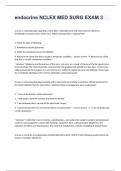Exam (elaborations)
endocrine NCLEX MED SURG EXAM 3 questions with answers 2024
- Course
- Institution
endocrine NCLEX MED SURG EXAM 3A nurse is collecting data regarding a client after a thyroidectomy and notes that the client has developed hoarseness and a weak voice. Which nursing action is appropriate? 1. Check for signs of bleeding. 2. Administer calcium gluconate. 3. Notify the registered...
[Show more]



